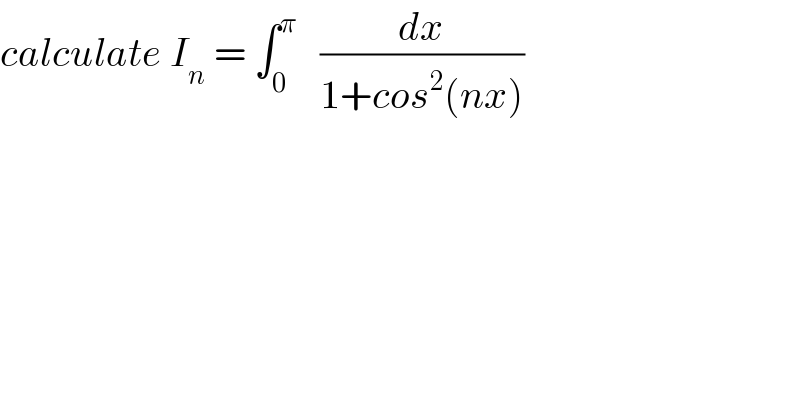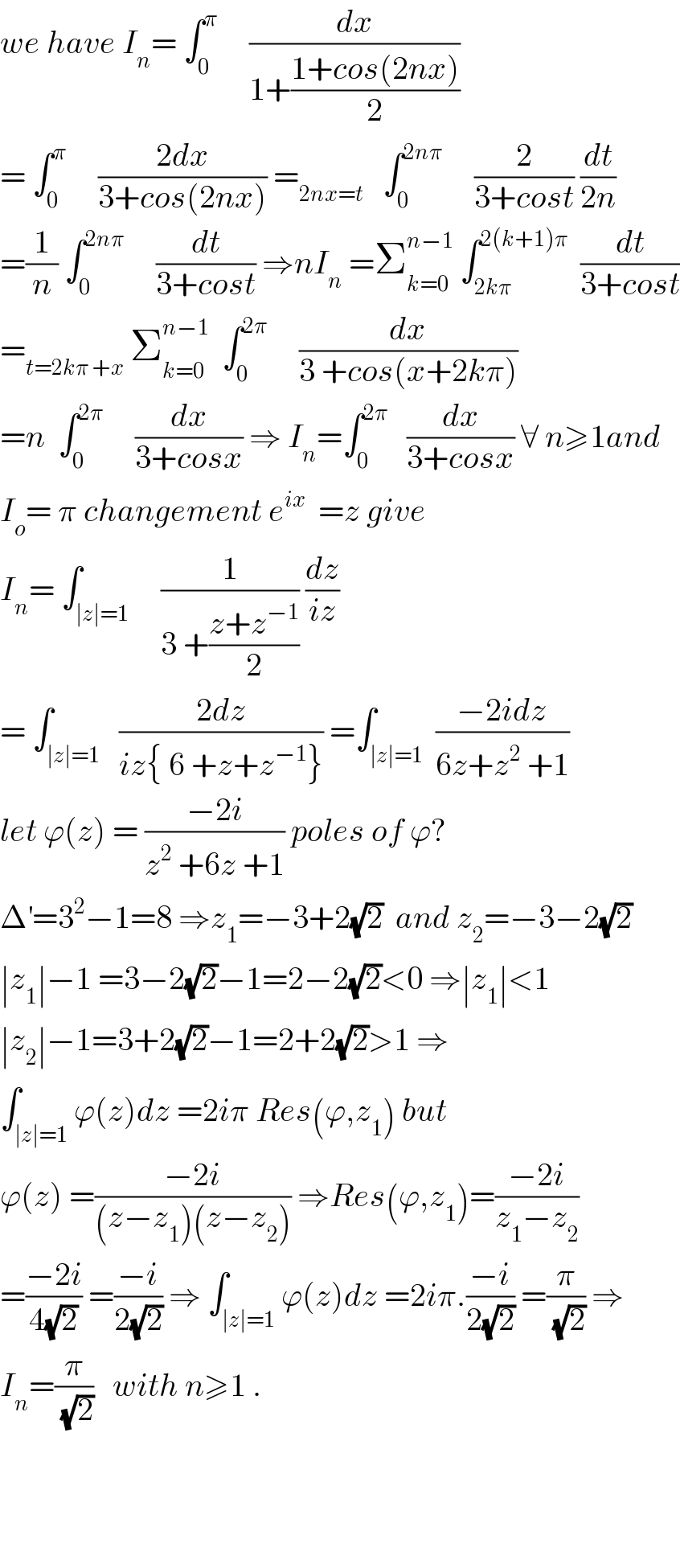Question Number 36936 by maxmathsup by imad last updated on 07/Jun/18

$${calculate}\:{I}_{{n}} \:=\:\int_{\mathrm{0}} ^{\pi} \:\:\:\frac{{dx}}{\mathrm{1}+{cos}^{\mathrm{2}} \left({nx}\right)} \\ $$
Commented by math khazana by abdo last updated on 02/Aug/18

$${we}\:{have}\:{I}_{{n}} =\:\int_{\mathrm{0}} ^{\pi} \:\:\:\:\:\frac{{dx}}{\mathrm{1}+\frac{\mathrm{1}+{cos}\left(\mathrm{2}{nx}\right)}{\mathrm{2}}} \\ $$$$=\:\int_{\mathrm{0}} ^{\pi} \:\:\:\:\:\frac{\mathrm{2}{dx}}{\mathrm{3}+{cos}\left(\mathrm{2}{nx}\right)}\:=_{\mathrm{2}{nx}={t}} \:\:\:\int_{\mathrm{0}} ^{\mathrm{2}{n}\pi} \:\:\:\:\:\frac{\mathrm{2}}{\mathrm{3}+{cost}}\:\frac{{dt}}{\mathrm{2}{n}} \\ $$$$=\frac{\mathrm{1}}{{n}}\:\int_{\mathrm{0}} ^{\mathrm{2}{n}\pi} \:\:\:\:\:\frac{{dt}}{\mathrm{3}+{cost}}\:\Rightarrow{nI}_{{n}} \:=\sum_{{k}=\mathrm{0}} ^{{n}−\mathrm{1}} \:\int_{\mathrm{2}{k}\pi} ^{\mathrm{2}\left({k}+\mathrm{1}\right)\pi} \:\:\frac{{dt}}{\mathrm{3}+{cost}} \\ $$$$=_{{t}=\mathrm{2}{k}\pi\:+{x}} \:\sum_{{k}=\mathrm{0}} ^{{n}−\mathrm{1}} \:\:\int_{\mathrm{0}} ^{\mathrm{2}\pi} \:\:\:\:\:\frac{{dx}}{\mathrm{3}\:+{cos}\left({x}+\mathrm{2}{k}\pi\right)} \\ $$$$={n}\:\:\int_{\mathrm{0}} ^{\mathrm{2}\pi} \:\:\:\:\:\frac{{dx}}{\mathrm{3}+{cosx}}\:\Rightarrow\:{I}_{{n}} =\int_{\mathrm{0}} ^{\mathrm{2}\pi} \:\:\:\frac{{dx}}{\mathrm{3}+{cosx}}\:\forall\:{n}\geqslant\mathrm{1}{and} \\ $$$${I}_{{o}} =\:\pi\:{changement}\:{e}^{{ix}} \:\:={z}\:{give} \\ $$$${I}_{{n}} =\:\int_{\mid{z}\mid=\mathrm{1}} \:\:\:\:\frac{\mathrm{1}}{\mathrm{3}\:+\frac{{z}+{z}^{−\mathrm{1}} }{\mathrm{2}}}\:\frac{{dz}}{{iz}} \\ $$$$=\:\int_{\mid{z}\mid=\mathrm{1}} \:\:\frac{\mathrm{2}{dz}}{{iz}\left\{\:\mathrm{6}\:+{z}+{z}^{−\mathrm{1}} \right\}}\:=\int_{\mid{z}\mid=\mathrm{1}} \:\frac{−\mathrm{2}{idz}}{\mathrm{6}{z}+{z}^{\mathrm{2}} \:+\mathrm{1}} \\ $$$${let}\:\varphi\left({z}\right)\:=\:\frac{−\mathrm{2}{i}}{{z}^{\mathrm{2}} \:+\mathrm{6}{z}\:+\mathrm{1}}\:{poles}\:{of}\:\varphi? \\ $$$$\Delta^{'} =\mathrm{3}^{\mathrm{2}} −\mathrm{1}=\mathrm{8}\:\Rightarrow{z}_{\mathrm{1}} =−\mathrm{3}+\mathrm{2}\sqrt{\mathrm{2}}\:\:{and}\:{z}_{\mathrm{2}} =−\mathrm{3}−\mathrm{2}\sqrt{\mathrm{2}} \\ $$$$\mid{z}_{\mathrm{1}} \mid−\mathrm{1}\:=\mathrm{3}−\mathrm{2}\sqrt{\mathrm{2}}−\mathrm{1}=\mathrm{2}−\mathrm{2}\sqrt{\mathrm{2}}<\mathrm{0}\:\Rightarrow\mid{z}_{\mathrm{1}} \mid<\mathrm{1} \\ $$$$\mid{z}_{\mathrm{2}} \mid−\mathrm{1}=\mathrm{3}+\mathrm{2}\sqrt{\mathrm{2}}−\mathrm{1}=\mathrm{2}+\mathrm{2}\sqrt{\mathrm{2}}>\mathrm{1}\:\Rightarrow \\ $$$$\int_{\mid{z}\mid=\mathrm{1}} \varphi\left({z}\right){dz}\:=\mathrm{2}{i}\pi\:{Res}\left(\varphi,{z}_{\mathrm{1}} \right)\:{but} \\ $$$$\varphi\left({z}\right)\:=\frac{−\mathrm{2}{i}}{\left({z}−{z}_{\mathrm{1}} \right)\left({z}−{z}_{\mathrm{2}} \right)}\:\Rightarrow{Res}\left(\varphi,{z}_{\mathrm{1}} \right)=\frac{−\mathrm{2}{i}}{{z}_{\mathrm{1}} −{z}_{\mathrm{2}} } \\ $$$$=\frac{−\mathrm{2}{i}}{\mathrm{4}\sqrt{\mathrm{2}}}\:=\frac{−{i}}{\mathrm{2}\sqrt{\mathrm{2}}}\:\Rightarrow\:\int_{\mid{z}\mid=\mathrm{1}} \varphi\left({z}\right){dz}\:=\mathrm{2}{i}\pi.\frac{−{i}}{\mathrm{2}\sqrt{\mathrm{2}}}\:=\frac{\pi}{\:\sqrt{\mathrm{2}}}\:\Rightarrow \\ $$$${I}_{{n}} =\frac{\pi}{\:\sqrt{\mathrm{2}}}\:\:\:{with}\:{n}\geqslant\mathrm{1}\:. \\ $$$$ \\ $$$$ \\ $$$$ \\ $$
Commented by math khazana by abdo last updated on 02/Aug/18

$${I}_{\mathrm{0}} =\frac{\pi}{\mathrm{2}} \\ $$
